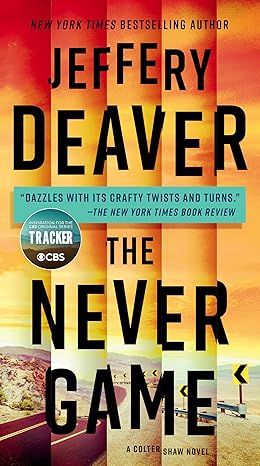The Never Game (A Colter Shaw Novel)
4.3
-
12,364 ratings
The first installment in Jeffery Deaver’s Colter Shaw series—the inspiration for the CBS original series TRACKER starring Justin Hartley!
The son of a survivalist family, Colter Shaw is an expert tracker. Now he makes a living as a “reward seeker,” traveling the country to help police solve crimes and locate missing persons for private citizens.
“You’ve been abandoned. Escape if you can. Or die with dignity.”
Hired by the father of a young woman who has gone missing in Silicon Valley, Shaw's search takes him into the dark heart of America’s cutthroat billion-dollar video-game industry. When another person goes missing, Shaw must ask: Is a madman bringing a twisted video game to life?
Encountering eccentric designers, trigger-happy gamers, and ruthless tech titans, Shaw soon learns that he isn't the only one on the hunt: someone is on his trail and closing fast....
Named a Crime Novel of the Year by The New York Times Book Review, The Never Game proves once more why “Deaver is a genius when it comes to manipulation and deception” (Associated Press).
Kindle
$1.99
Available instantly
Audiobook
$0.00
with membership trial
Hardcover
$3.71
Paperback
$9.99
Ships from
Amazon.com
Payment
Secure transaction
ISBN-10
0525535950
ISBN-13
978-0525535959
Print length
496 pages
Language
English
Publisher
G.P. Putnam's Sons
Publication date
March 23, 2020
Dimensions
4.25 x 1.06 x 7.5 inches
Item weight
9.6 ounces
Popular Highlights in this book
Not dying isn’t the same as being alive. You’re only alive when you’re surviving. And you only survive when there’s a risk there’s something you can lose. The more you risk losing, the more you’re alive.
Highlighted by 180 Kindle readers
When you write something by hand, slowly, you own the words. You type them, less so. You read them, even less. And you listen, hardly at all.
Highlighted by 160 Kindle readers
Love, Colter Shaw had learned, could be an endlessly refillable prescription of madness.
Highlighted by 141 Kindle readers
Product details
ASIN :
B07HDSGVMQ
File size :
7223 KB
Text-to-speech :
Enabled
Screen reader :
Supported
Enhanced typesetting :
Enabled
X-Ray :
Enabled
Word wise :
Enabled
Editorial Reviews
Praise for The Never Game
“Jeffery Deaver creates insanely devious plots calculated to make your head explode…[The Never Game] dazzles with its crafty twists and turns.”—The New York Times Book Review
“Deaver introduces a fascinating new character in the methodical Colter Shaw. Nothing is predictable in the case, and like a curvy mountain road, the twists are intense. Hopefully more stories with Shaw are in the future.”—Associated Press
“[A] superb series launch from Thriller Award winner Deaver…Fans of twisty suspense that pushes the envelope of plausibility without inviting disbelief will be enthralled.”—Publishers Weekly (starred review)
“The story is—this will come as no surprise to Deaver’s many fans—full of twists and right-angle turns, and a second Colter Shaw novel feels not just inevitable but mandatory. Deaver is a hit maker who always delivers the goods.”—Booklist
“Award-winning author Deaver introduces an engaging new protagonist with staying power. Colter’s backstory is fascinating and his persona as much a part of the tale as the crime itself. This is a sure bet for fans of suspense and will find a home with those who like their protagonists to be a central part of the mystery.”—Library Journal
“As always Deaver gets you in his stealthy grip on page one, and then takes you on a wild and inventive ride...this time with new star character Colter Shaw. No one in the world does this kind of thing better than Deaver.”—Lee Child
“With a twisty plot, riveting characters, and relentless suspense, The Never Game fires on every single cylinder. Readers will delight in this compelling new character from one of the finest suspense writers in the field. I always look forward to the new Deaver, but this one tops them all.”—Karin Slaughter
“Lightning-fast and loaded with twists, The Never Game is a thrill a minute from one of the best. Don’t miss it.”—Harlan Coben
“Jeffery Deaver is a one of our most exciting storytellers, and The Never Game pulls off the remarkable feat of intertwining a devilish plot with unforgettable characters, fascinating disquisitions with propulsive action, every element conspiring to make it almost impossible to not turn the page. I absolutely loved it.”—Chris Pavone
“Jeffery Deaver knows how to deliver exactly what a reader wants. He has a gift for place and character and, here, the tension ratchets up, page by page, as we follow the exploits of a new hero. Crisply plotted and fraught with danger.”—Steve Berry
“Terrific writing, vivid and raw, Deaver grips from the very first line and never lets up. He is, hands-down, one of the finest thriller writers of our time.”—Peter James
“The Never Game is the very definition of a page-turner.”—Ian Rankin
“Grabbing you from the first page, Jeffery Deaver crafts a devilish plot that unfolds with breakneck speed. An excellent start to a new series, Colter Shaw has comfortably nestled onto the bench with Lincoln Rhyme and Kathryn Dance - one of our best literary puppet-masters at the end of all their strings.”—J.D. Barker
“Jeffery Deaver scores yet again with a fascinating new detective, Colter Shaw, and a plot as full of thrills and twists and turns as you would expect from him. With The Never Game you know you are in the hands of a master. But be warned—don’t start this too late in the evening because sleep would be an annoying interruption once you’ve started reading!”—Peter Robinson
“[The Never Game] has film adaptation written all over it.”—Bookpage
“I loved The Never Game and I particularly loved its hero, Colter Shaw, the original and fascinating investigator at the heart of the book. It’s a twisty 'keep you up all night'page-turner of a book with a wonderfully human core. A fantastic read.”—Kate Hamer, author ofThe Girl in the Red Coat
Read more
Sample
1.
He asked the woman to repeat herself.
“That thing they throw,” she said. “With the burning rag in it?”
“They throw?”
“Like at riots? A bottle. You see ’em on TV.”
Colter Shaw said, “A Molotov cocktail.”
“Yeah, yeah,” Carole was saying. “I think he had one.”
“Was it burning? The rag part?”
“No. But, you know . . .��”
Carole’s voice was raspy, though she wasn’t presently a smoker that Shaw had seen or smelled. She was draped with a green dress of limp cloth. Her natural expression seemed to be one of concern yet this morning it was more troubled than usual. “He was over there.” She pointed.
The Oak View RV park, one of the scruffier that Shaw had stayed at, was ringed with trees, mostly scrub oak and pine, some dead, all dry. And thick. Hard to see “over there.”
“You called the police?”
A pause. “No, if it wasn’t a . . . What again?”
“Molotov cocktail.”
“If he didn’t have one, it’d be embarrassing. And I call the cops enough, for stuff here.”
Shaw knew dozens of RV park owners around the country. Mostly couples, as it’s a good gig for middle-aged marrieds. If there’s just a single manager, like Carole, it was usually a she, and she was usually a widow. They tend to dial 911 for camp disputes more than their late husbands, men who often went about armed.
“On the other hand,” she continued, “fire. Here. You know.”
California was a tinderbox, as anybody who watched the news knew. You think of state parks and suburbs and agricultural fields; cities, though, weren’t immune to nature’s conflagrations. Shaw believed that one of the worst brush fires in the history of the state had been in Oakland, very near where they were now standing.
“Sometimes, I kick somebody out, they say they’ll come back and get even.” She added with astonishment, “Even when I caught them stealing forty amps when they paid for twenty. Some people. Really.”
He asked, “And you want me to . . . ?”
“I don’t know, Mr. Shaw. Just take a look. Could you take a look? Please?”
Shaw squinted through the flora and saw, maybe, motion that wasn’t from the breeze. A person walking slowly? And if so did the pace mean that he was moving tactically—that is, with some mischief in mind?
Carole’s eyes were on Shaw, regarding him in a particular way. This happened with some frequency. He was a civilian, never said he was anything else. But he had cop fiber.
Shaw circled to the front of the park and walked on the cracked and uneven sidewalk, then on the grassy shoulder of the unbusy road in this unbusy corner of the city.
Yes, there was a man, in dark jacket, blue jeans and black stocking cap, some twenty yards ahead. He wore boots that could be helpful on a hike through brush and equally helpful to stomp an opponent. And, yes, either he was armed with a gas bomb or he was holding a Corona and a napkin in the same hand. Early for a beer some places; not in this part of Oakland.
Shaw slipped off the shoulder into the foliage to his right and walked more quickly, though with care to stay silent. The needles that had pitched from branch to ground in droves over the past several seasons made stealth easy.
Whoever this might be, vengeful lodger or not, he was well past Carole’s cabin. So she wasn’t at personal risk. But Shaw wasn’t giving the guy a pass just yet.
This felt wrong.
Now the fellow was approaching the part of the RV camp where Shaw’s Winnebago was parked, among many other RVs.
Shaw had more than a passing interest in Molotov cocktails. Several years ago, he’d been searching for a fugitive on the lam for an oil scam in Oklahoma when somebody pitched a gas bomb through the windshield of his camper. The craft burned to the rims in twenty minutes, personal effects saved in the nick. Shaw still carried a distinct and unpleasant scent memory of the air surrounding the metal carcass.
The percentage likelihood that Shaw would be attacked by two Russian-inspired weapons in one lifetime, let alone within several years, had to be pretty small. Shaw put it at five percent. A figure made smaller yet by the fact that he had come to the Oakland/Berkeley area on personal business, not to ruin a fugitive’s life. And while Shaw had committed a transgression yesterday, the remedy for that offense would’ve been a verbal lashing, a confrontation with a beefy security guard or, at worst, the police. Not a firebomb.
Shaw was now only ten yards behind the man, who was scanning the area—looking into the trailer park as well as up and down the road and at several abandoned buildings across it.
The man was trim, white, with a clean-shaven face. He was about five-eight, Shaw estimated. The man’s facial skin was pocked. Under the cap, his brown hair seemed to be cut short. There was a rodent-like quality to his appearance and his movements. In the man’s posture Shaw read ex-military. Shaw himself was not, though he had friends and acquaintances who were, and he had spent a portion of his youth in quasi-military training, quizzed regularly on the updated U.S. Army Survival Manual FM 21-76.
And the man was indeed holding a Molotov cocktail. The napkin was stuffed into the neck of the bottle and Shaw could smell gasoline.
Shaw was familiar with revolver, semiautomatic pistol, semiautomatic rifle, bolt-action rifle, shotgun, bow and arrow and slingshot. And he had more than a passing interest in blades. He now withdrew from his pocket the weapon he used most frequently: his mobile, presently an iPhone. He punched some keys and, when the police and fire emergency dispatcher answered, whispered his location and what he was looking at. Then he hung up. He typed a few more commands and slipped the cell into the breast pocket of his dark plaid sport coat. He thought, with chagrin, about his transgression yesterday and wondered if the call would somehow allow the authorities to identify and collar him. This seemed unlikely.
Shaw had decided to wait for the arrival of the pros. Which is when a cigarette lighter appeared in the man’s hand with no cigarette to accompany it.
That settled the matter.
Shaw stepped from the bushes and closed the distance. “Morning.”
The man turned quickly, crouching. Shaw noted that he didn’t reach for his belt or inside pocket. This might have been because he didn’t want to drop the gas bomb—or because he wasn’t armed. Or because he was a pro and knew exactly where his gun was and how many seconds it would take to draw and aim and fire.
Narrow eyes, set in a narrow face, looked Shaw over for guns and then for less weaponly threats. He took in the black jeans, black Ecco shoes, gray-striped shirt and the jacket. Short-cut blond hair lying close to his head. Rodent would have thought “cop,” yet the moment for a badge to appear and an official voice to ask for ID or some such had come and gone. He had concluded that Shaw was civilian. And not one to be taken lightly. Shaw was about one-eighty, just shy of six feet, and broad, with strappy muscle. A small scar on cheek, a larger one on neck. He didn’t run as a hobby but he rock-climbed and had been a champion wrestler in college. He was in scrapping shape. His eyes held Rodent’s, as if tethered.
“Hey there.” A tenor voice, taut like a stretched fence wire. Midwest, maybe from Minnesota.
Shaw glanced down at the bottle.
“Could be pee, not gas, don’tcha know.” The man’s smile was as tight as the timbre of his voice. And it was a lie.
Wondering if this’d turn into a fight. Last thing Shaw wanted. He hadn’t hit anybody for a long time. Didn’t like it. Liked getting hit even less.
“What’s that about?” Shaw nodded at the bottle in the man’s hand.
“Who are you?”
“A tourist.”
“Tourist.” The man debated, eyes rising and falling. “I live up the street. There’s some rats in an abandoned lot next to me. I was going to burn them out.”
“California? The driest June in ten years?”
Shaw had made that up but who’d know?
Not that it mattered. There was no lot and there were no rats, though the fact that the man had brought it up suggested he might have burned rats alive in the past. This was where dislike joined caution.
Never let an animal suffer . . .
Then Shaw was looking over the man’s shoulder—toward the spot he’d been headed for. A vacant lot, true, though it was next to an old commercial building. Not the imaginary vacant lot next to the man’s imaginary home.
The man’s eyes narrowed further, reacting to the bleat of the approaching police car.
“Really?” Rodent grimaced, meaning: You had to call it in? He muttered something else too.
Shaw said, “Set it down. Now.”
The man didn’t. He calmly lit the gasoline-soaked rag, which churned with fire, and like a pitcher aiming for a strike, eyed Shaw keenly and flung the bomb his way.
2.
Molotov cocktails don’t blow up—there’s not enough oxygen inside a sealed bottle. The burning rag fuse ignites the spreading gas when the glass shatters.
Which this one did, efficiently and with modest spectacle.
A silent fireball rose about four feet in the air.
Shaw dodged the risk of singe and Carole ran, screaming, to her cabin. Shaw debated pursuit, but the crescent of grass on the shoulder was burning crisply and getting slowly closer to tall shrubs. He vaulted the chain-link, sprinted to his RV and retrieved one of the extinguishers. He returned, pulled the pin and blasted a whoosh of white chemical on the fire, taming it.
“Oh my God. Are you okay, Mr. Shaw?” Carole was plodding up, carrying an extinguisher of her own, a smaller, one-hand canister. Hers wasn’t really necessary, yet she too pulled the grenade pin and let fly, because, of course, it’s always fun. Especially when the blaze is nearly out.
After a minute or two, Shaw bent down and, with his palm, touched every square inch of the scorch, as he’d learned years ago.
Never leave a campfire without patting the ash.
A pointless glance after Rodent. He’d vanished.
A patrol car braked to a stop. Oakland PD. A large black officer, with a glistening, shaved head, climbed out, holding a fire extinguisher of his own. Of the three, his was the smallest. He surveyed the embers and the char and replaced the red tank under his front passenger seat.
Officer L. Addison, according to the name badge, turned to Shaw. The six-foot-five cop might get confessions just by walking up to a suspect and leaning down.
“You were the one called?” Addison asked.
“I did.” Shaw explained that the person who’d thrown the cocktail had just run off. “That way.” He gestured down the weedy street, handfuls of trash every few yards. “He’s probably not too far away.”
The cop asked what had happened.
Shaw told him. Carole supplemented, with the somewhat gratuitous addendum about the difficulty of being a widow running a business by herself. “People take advantage. I push back. I have to. You would. Sometimes they threaten you.” Shaw noted she’d glanced at Addison’s left hand, where no jewelry resided.
Addison cocked his head toward the Motorola mounted on his shoulder and gave Central a summary, with the description from Shaw. It had been quite detailed but he’d left out the rodent-like aspect, that being largely a matter of opinion.
Addison’s eyes turned back to Shaw. “Could I see some ID?”
There are conflicting theories about what to do when the law asks for ID and you’re not a suspect. This was a question Shaw often confronted, since he frequently found himself at crime scenes and places where investigations were under way. You generally didn’t have to show anybody anything. In that case, you’d have to be prepared to endure the consequences of your lack of cooperation. Time is one of the world’s most valuable commodities, and being pissy with cops guarantees you’re going to lose big chunks of it.
His hesitation at the moment, though, was not on principle but because he was worried that his motorbike’s license had been spotted at the site of yesterday’s transgression. His name might therefore be in the system.
Then he recalled that they’d know him already; he’d called 911 from his personal phone, not a burner. So Shaw handed over the license.
Addison took a picture of it with his phone and uploaded the details somewhere.
Shaw noted that he didn’t do the same with Carole, even though it was her trailer court that had tangentially been involved. Some minor profiling there, Shaw reflected: stranger in town versus a local. This he kept to himself.
Addison looked at the results. He eyed Shaw closely.
A reckoning for yesterday’s transgression? Shaw now chose to call it what it was: theft. There’s no escape in euphemism.
Apparently the gods of justice were not a posse after him today. Addison handed the license back. “Did you recognize him?” he asked Carole.
“No, sir, but it’s hard to keep track. We get a lot of people here. Lowest rates in the area.”
“Did he throw the bottle at you, Mr. Shaw?”
“Toward. A diversion, not assault. So he could get away.”
This gave the officer a moment’s pause.
Carole blurted: “I looked it up online. Molotov secretly worked for Putin.”
Both men looked at her quizzically. Then Shaw continued with the officer: “And to burn the evidence. Prints and DNA on the glass.”
Addison remained thoughtful. He was the sort, common among police, whose lack of body language speaks volumes. He’d be processing why Shaw had considered forensics.
The officer said, “If he wasn’t here to cause you any problem, ma’am, what was he here about, you think?”
Before Carole answered, Shaw said, “That.” He pointed across the street to the vacant lot he’d noted earlier.
The trio walked toward it.
The trailer camp was in a scruffy commercial neighborhood, off Route 24, where tourists could stage before a trip to steep Grizzly Peak or neighboring Berkeley. This trash-filled, weedy lot was separated from the property behind it by an old wooden fence about eight feet tall. Local artists had used it as a canvas for some very talented artwork: portraits of Martin Luther King, Jr., Malcolm X and two other men Shaw didn’t recognize. As the three got closer, Shaw saw the names printed below the pictures: Bobby Seale and Huey P. Newton, who’d been connected with the Black Panther Party. Shaw remembered cold nights in his television-free childhood home. Ashton would read to Colter and his siblings, mostly American history. Much of it about alternative forms of governance. The Black Panthers had figured in several lectures.
“So,” Carole said, her mouth twisted in distaste. “A hate crime. Terrible.” She added, with a nod to the paintings, “I called the city, told them they should preserve it somehow. They never called back.”
Addison’s radio crackled. Shaw could hear the transmission: a unit had cruised the streets nearby and seen no one fitting the description of the arsonist.
Shaw said, “I got a video.”
“You did?”
“After I called nine-one-one I put the phone in my pocket.” He touched the breast pocket, on the left side of his jacket. “It was recording the whole time.”
“Is it recording now?”
“It is.”
“Would you shut it off?” Addison asked this in a way that really meant: Shut it off. Without a question mark.
Shaw did. Then: “I’ll send you a screenshot.”
“Okay.”
Shaw clicked the shot, got Addison’s mobile number and sent the image his way. The men were four feet apart but Shaw imagined the electrons’ journey took them halfway around the world.
The officer’s phone chimed; he didn’t bother to look at the screenshot. He gave Carole his card, one to Shaw as well. Shaw had quite the collection of cops’ cards; he thought it amusing that police had business cards like advertising executives and hedge fund managers.
After Addison left, Carole said, “They’re not going to do winkety, are they?”
“No.”
“Well, thanks for looking into it, Mr. Shaw. I’d’ve felt purely horrid you’d gotten burned.”
“Not a worry.”
Carole returned to the cabin and Shaw to his Winnebago. He was reflecting on one aspect of the encounter he hadn’t shared with Officer Addison. After the exasperated “Really?” in reference to the 911 call, Rodent’s comment might have been “Why’d you do that shit?”
It was also possible—more than fifty percent—that he’d said, “Why’d you do that, Shaw?”
Which, if that had in fact happened, meant Rodent knew him or knew about him.
And that, of course, would put a whole new spin on the matter.
Read more
About the authors
Jeffery Deaver
Jeffery Deaver is an international number-one bestselling author. His novels have appeared on bestseller lists around the world. His books are sold in 150 countries and translated into over twenty-five languages. He has served two terms as president of Mystery Writers of America, and was recently named a Grand Master of MWA, whose ranks include Agatha Christie, Ellery Queen, Mary Higgins Clark and Walter Mosely.
The author of over forty novels, three collections of short stories and a nonfiction law book, and a lyricist of a country-western album, he’s received or been shortlisted for dozens of awards. His "The Bodies Left Behind" was named Novel of the Year by the International Thriller Writers association, and his Lincoln Rhyme thriller "The Broken Window" and a stand-alone, "Edge," were also nominated for that prize. "The Garden of Beasts" won the Steel Dagger from the Crime Writers Association in England. He’s also been nominated for eight Edgar Awards by the MWA.
Deaver has been honored with the Lifetime Achievement Award by the Bouchercon World Mystery Convention, the Strand Magazine’s Lifetime Achievement Award and the Raymond Chandler Lifetime Achievement Award in Italy.
His book "A Maiden’s Grave" was made into an HBO movie starring James Garner and Marlee Matlin, and his novel "The Bone Collector" was a feature release from Universal Pictures, starring Denzel Washington and Angelina Jolie. Lifetime aired an adaptation of his "The Devil’s Teardrop." NBC television recently aired the nine-episode prime-time series, "Lincoln Rhyme: Hunt for the Bone Collector."
You can find out more about Jeffery on his website www.jefferydeaver.com, Facebook page facebook.com/JefferyDeaver, and follow him on Twitter @JefferyDeaver.
Read more
Reviews
Customer reviews
4.3 out of 5
12,364 global ratings
Richard B. Schwartz
5
JD Introduces A New (And Interesting) Series Character
Reviewed in the United States on May 23, 2019
Verified Purchase
Jeffery Deaver’s latest novel, THE NEVER GAME, introduces a new series character, Colter Shaw. Colter is a home-schooled loner whose dad was an academic and part prophet, part survivalist. He is presented as having been paranoid, but with the proviso that sometimes people are really out to get the (putatively) paranoid. Colter makes his living by (among other things) finding missing persons. He is not a PI and he is not a skip-tracer for bail bondsmen. He is a helpful guy drawn to good causes and he is willing to accept rewards on the installment plan. This is a tad far-fetched, given the financial uncertainties of the job and the uglier forms of competition that Colter will encounter, but this gives him a vagabond, Jack Reacherist quality that many readers will appreciate. Unlike Jack Reacher (but like Brett Battles’ characters), he has individuals a phone call or email away who can search databases, find new jobs, and so on. He does not hitchhike, but rides around on a dirt bike which he tows on the back of his Winnebago. Yes: a crime solver who drives a Winnebago.
Colter is drawn into the story of a young woman who has been abducted and forced to play a real-life role in a popular video game. The person is trapped, has five items which can be used to aid in his/her escape and must then either free him or herself or ‘die with dignity’. Set in Silicon Valley (whose blandness JD nails), this is a story ‘about’ video gaming—its banalities, its attractions, its possible benefits and its definite negatives. Gamers will probably enjoy it. Deaver (as expected) knows all of its finer details, while his protagonist is skeptical of its ‘world’ and its social impact.
The plot is strong and the subsidiary characters interesting. While the protagonist seeks the characters caught in the video game scenarios he is also pursuing a mystery concerning his father. Thus, the personal and the professional intersect in interesting ways. There is the usual Deaver mystification and the reversals upon reversals. The novel held my interest throughout. I prefer the Lincoln Rhyme concept/character but I will look forward to future novels concerning Colter Shaw. The ending clearly opens the door to a sequel; this is not a standalone (or certainly doesn’t look or feel like one). JD remains one of the most skilled and informed writers of our time.
Read more
36 people found this helpful
Pat Markel
5
Highly recommend this seller!
Reviewed in the United States on July 3, 2024
Verified Purchase
They found a copy of this book that looks great even though it’s not current. The new tv series “Tracker” called my attention to the books by Deaver. Great packaging and fast shipping!
Teacher's Pet
5
Great read
Reviewed in the United States on July 28, 2024
Verified Purchase
My husband loved it. Thank you
Douglas Lucy
5
Colter rocks
Reviewed in the United States on June 28, 2024
Verified Purchase
I didn’t know the series was Tracker was from the mind of Jeffery Deaver. When I saw his name in the end credits, I had to read them. 1 down 3 to go. It is well crafted story, each character fleshes out well and enough twists to keep you guessing. It’s a must read!
3 people found this helpful
island girl
4
Good insight into the world of gaming
Reviewed in the United States on July 20, 2024
Verified Purchase
A good read involving mystery and gaming. I originally picked this book because of the Tracker series. I found it interesting and well written. It was a bit slow in some parts but it all came together in the end. Will definitely be reading the next book of the series.
Top Jeffery Deaver titles
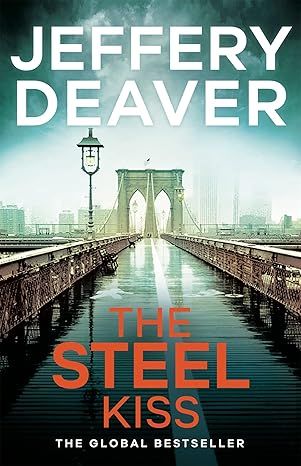
The Steel Kiss: Lincoln Rhyme Book 12 (Lincoln Rhyme Thrillers)
4.3
-
15,078
$2.55
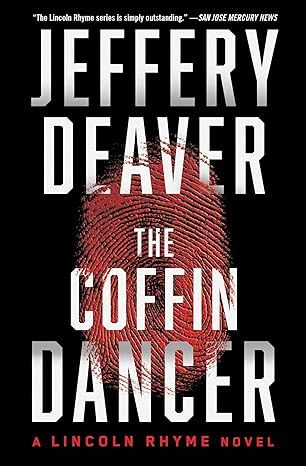
The Coffin Dancer: A Novel (2) (Lincoln Rhyme Novel)
4.5
-
5,617
$1.31
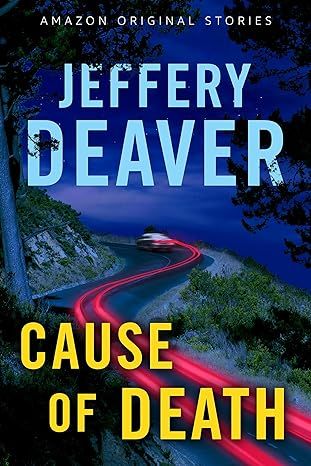
Cause of Death
4.2
-
5,166
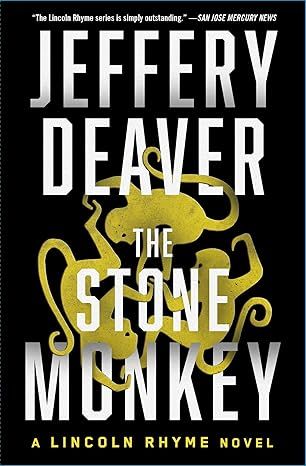
The Stone Monkey: A Lincoln Rhyme Novel (4)
4.5
-
4,802
$1.24
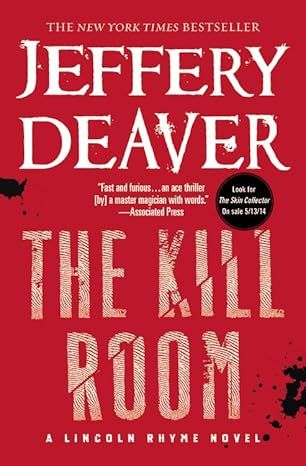
The Kill Room (Lincoln Rhyme)
4.3
-
6,193
$5.29
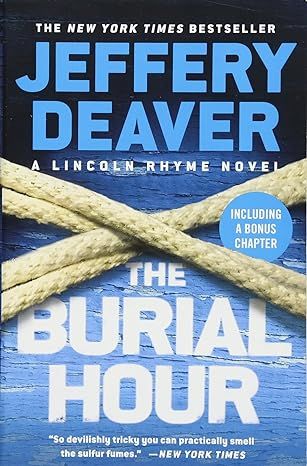
The Burial Hour (A Lincoln Rhyme Novel, 14)
4.2
-
12,268
$9.99
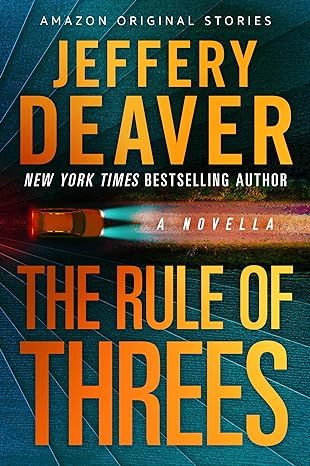
The Rule of Threes: A Novella
4
-
10,459
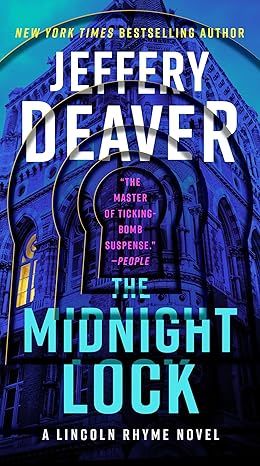
The Midnight Lock (Lincoln Rhyme Novel)
4.5
-
10,344
$2.05
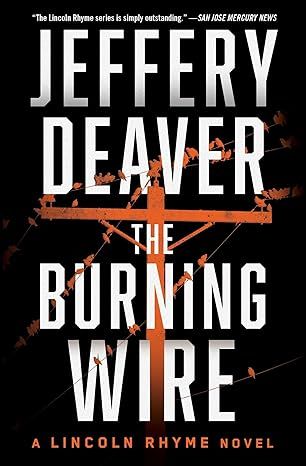
The Burning Wire (9) (Lincoln Rhyme Novel)
4.4
-
5,500
$3.99
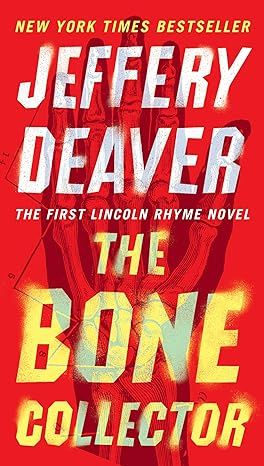
The Bone Collector (Lincoln Rhyme Novel)
4.5
-
7,183
$7.99
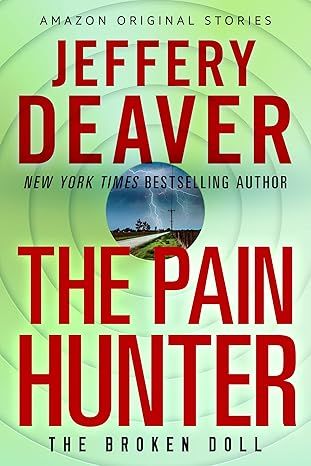
The Pain Hunter (The Broken Doll Book 1)
4.2
-
5,263
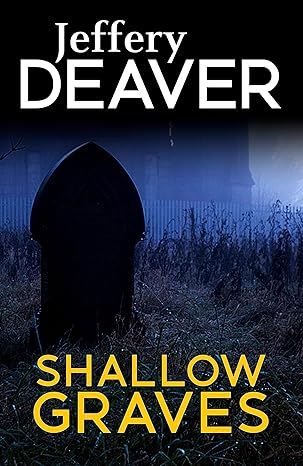
Shallow Graves
4
-
1,304
$3.82
Best Sellers

The Tuscan Child
4.2
-
100,022
$8.39

The Thursday Murder Club: A Novel (A Thursday Murder Club Mystery)
4.3
-
155,575
$6.33

Sapiens: A Brief History of Humankind
4.6
-
140,302
$13.49

The Butterfly Garden (The Collector, 1)
4.3
-
88,556
$9.59

Things We Hide from the Light (Knockemout Series, 2)
4.4
-
94,890
$11.66

The Last Thing He Told Me: A Novel
4.3
-
154,085
$2.99

The Perfect Marriage: A Completely Gripping Psychological Suspense
4.3
-
143,196
$9.47

The Coworker
4.1
-
80,003
$13.48

First Lie Wins: A Novel (Random House Large Print)
4.3
-
54,062
$14.99

Mile High (Windy City Series Book 1)
4.4
-
59,745
$16.19

Layla
4.2
-
107,613
$8.99

The Locked Door
4.4
-
94,673
$8.53
